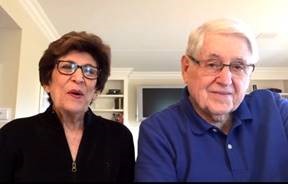Documenting Jewish Life in a Pandemic
Documenting Jewish Life
The Iowa Jewish Historical Society has joined a nationwide effort sponsored by the Council of American Jewish Museums (CAJM) to document and collect stories from around the nation on what it means to be Jewish in the era of COVID-19.
The Council and its member museums recognize that this is a critical time to be collecting personal stories and artifacts about the Jewish experience in America. It is a time in which Jewish life is responding to and changing in the face of the pandemic, the protests and struggles for justice, the election year, and the community work we all do together.
To ensure that this history is being preserved as it is happening, the Council is partnering with member museums and suppliers to ensure that museums can record and collect meaningful personal stories about the impact these forces are having on Jewish life.
Participating museums include: Breman Museum (Atlanta), Institute of Southern Jewish Life (Jackson, MS), Jewish History Museum and Holocaust Education Center (Tucson, AZ), Jewish Museum of Maryland, Los Angeles Museum of the Holocaust, Oregon Jewish Museum and Center for Holocaust Education, Capital Jewish Museum (Washington, DC), Jewish Museum of Florida at Florida International University, and IJHS.

Over the next several months, the IJHS will be working with synagogues and federations from across the state to identify people of all ages (middle schoolers through seniors) and backgrounds—first responders, COVID-survivors, rabbis, students, teachers, medical advisory boards, Federation and congregation members—to participate in these interviews. All interviews will be conducted online and questions will include:
- How has COVID-19 impacted your life overall? What has changed? What has remained the same?
- How has your work been affected? What impact has that had on you?
- Are there any rituals or Jewish practices that have been particularly meaningful to you in this moment?
- Where are you finding strength and support in this challenging time? What is bringing you joy?
- What gives you hope throughout these times?
- If you could share any message with future generations, what would that be?
For more information about this project, please contact the IJHS at ijhs@jewishdesmoines.org or leave a message at 515-987-0899 ext. 216.
Documenting Pesach
Help the Jewish Federation of Greater Des Moines and The Iowa Jewish Historical Society preserve this historical Pesach by submitting what your Seder looks like this year. Whether it be through a photo, video or written words, we want to collect documentation of how our community, across Iowa, celebrated Pesach this year.
By participating in this project, The Jewish Federation of Greater Des Moines and The Iowa Jewish Historical Society obtain the right to use and publish these materials for future projects. Each submission will be screened for appropriateness. All submissions should be uploaded to the IJHS DropBox folder below.
Submission Guidelines
Since the purpose of collecting these moments is for historical record, we are asking that any video or picture submission be accompanied by a text document with a related file name. Please follow these guidelines for information to be included.
For Photos:
- Submitters first and last name, and contact information (either email or phone number)
- Who is in the picture (first and last names, relationship to each other)
- Where the picture was taken (city and state)
- When the picture was taken (date)
- How was the Seder accomplished? (over a video chat service, just those in the picture, over the phone, etc.)
For Videos:
- Submitters first and last name, and contact information (either email or phone number)
- Who is in the video (first and last names)
- Where the video was taken (city and state)
- When the video was taken (date)
- How was the Seder accomplished? (over a video chat service, just those in the picture, over the phone, etc.)
For Written Documents:
- Submitters first and last name, and contact information (either email or phone number)
- Who was at the Seder (first and last names, relationship to each other)
- Where did the Seder take place (city and state)
- When did the Seder take place (date)
- Explanation of how this Seder is different than Seders in years past, of the community or world during this time, etc.
